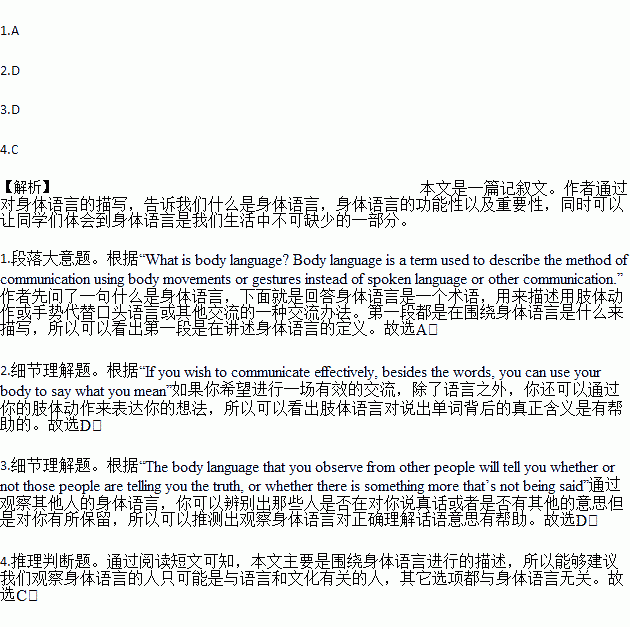题目内容
What is body language? Body language is a term used to describe the method of communication using body movements or gestures instead of spoken language or other communication. Body language also includes many movements that most people pay no attention to, such as winking(眨眼)and slight movements of the eyebrows and other facial expressions.
Perhaps body language is one of the most powerful forms of human expression, which makes up 50% or more of what we are communicating to other persons. If you wish to communicate effectively, besides the words, you can use your body to say what you mean.
Also, body language is one of the easiest ways for you to tell what’s really going on in a conversation with another person. The body language that you observe from other people will tell you whether or not those people are telling you the truth, or whether there is something more that’s not being said. Watch, look and observe. Sometimes you can tell more by a person’s body language than his words.
Besides, body language can be used for all sorts of things, such as showing confidence and winning respect in any situation. You can use body language to make people less nervous and make friends quickly persuaded and influenced.
1.What’s the man idea of Paragraph 1?
A. The definition of body language.
B. The importance of body language.
C. The occasions to use body language.
D. The ways to understand body language.
2.Which of the following is true of body language?
A. It’s always noticed by talked in conversations.
B. It’s more powerful than words in communication.
C. It’s the easiest way to make people less nervous.
D. It’s helpful to tell the real meaning behind words.
3.Why are people advised to observe the body language?
A. To show confidence.
B. To communicate easily.
C. To draw more attention.
D. To understand properly.
4.Which are people advised to observe the body language?
A. Sports and Education.
B. Diet and Health.
C. Language and Culture.
D. Science and Technology.
 名师指导期末冲刺卷系列答案
名师指导期末冲刺卷系列答案
